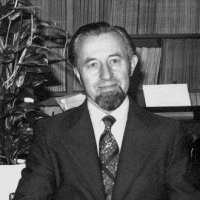Johannes Nitsche
In Memoriam
It is with sadness that we report the death of our distinguished colleague, Professor Johannes C. C. Nitsche, on August 9, 2006, at the age of 81. Johannes was born in southern Saxony in 1925. He received his master’s degree (Diplom) with F. Rellich in Göttingen and his doctorate with E. Hölder (the son of O. Hölder) in Leipzig. He joined the faculty of the University of Minnesota in 1957.
Johannes was a dedicated teacher who prepared his lectures with great care and delivered them with elegance and humor. He served as Head of the School of Mathematics from 1971 to 1978. After an initial two-year term, Johannes was the first to receive a five-year appointment as Head.
Johannes was a leader in the areas of calculus of variations, differential geometry and PDE’s. He was the author of more than ninety research papers in all, including eight papers co-authored with his brother, the late mathematician Joachim Nitsche. Among his outstanding papers we may note two examples: “ An elementary proof of Bernstein’s theorem on minimal surfaces ”, Annals of Mathematics (1957) and “ A new uniqueness theorem for minimal surfaces ”, Archive for Rational Mechanics and Analysis (1973). Johannes was the author of the definitive book Lectures on Minimal Surfaces. The German edition of this work appeared as Springer Grundlehren v. 199 (1975) and Part 1 of the English edition was published by Cambridge University Press (1989). He had planned two further parts to the English edition which he was unfortunately unable to complete. Some of the questions which he posed decades ago to interested mathematicians have still not been resolved: is there a smooth closed curve in three-space which bounds infinitely many minimal surfaces? Is there any curve of total curvature less than 4π which is the boundary of an orientable, non-simply connected minimal surface?
Johannes is survived by his wife Carmen, a daughter and two sons. He will be missed by his colleagues and friends.
(The newsletter committee is deeply grateful to Professor Robert Gulliver, without whom this article would not have been possible.)
